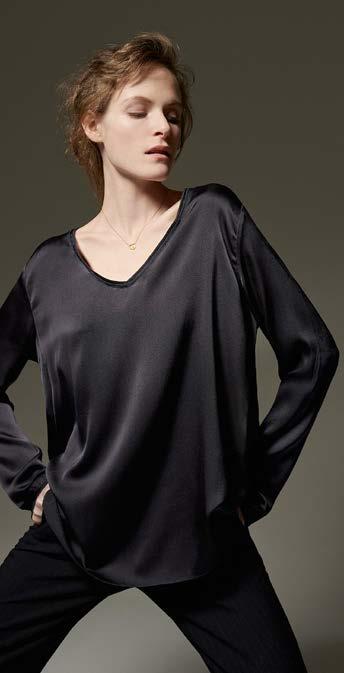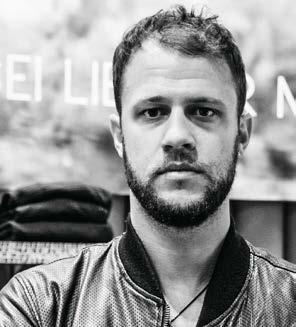
8 minute read
Sustainability is an Attitude
Excellent working conditions, high quality, and constant process optimisation are topics some companies, family businesses in particular, have always been aware of. For them, sustainable management is not something only to be considered when it’s trendy. Thinking of the next generation is their overriding principle. Text: Isabel Faiss, Martina Müllner-Seybold. Photos: Manufacturers
“F or me, sustainability begins with talking about terms,” says Marco Lanowy, the Managing Partner of Alberto. “We simply shouldn’t accept a return rate of 10 percent, shouldn’t produce special items, and shouldn’t inject additional or flash collections into the market. We all know that they are only seemingly successful. In reality, these practices waste resources: for the goods, for transport, and even within the company. Ultimately, it leaves us with stock that is no longer marketable – and that harms us all: the brand, the trade, and the environment.” The increased interest in sustainability issues is a serious topic for Alberto, but not a reason to engage in agitative activism. “We are a company that has existed almost 100 years. It is not our mission to paint it as green as possible now, but to ensure it can last another 100 years. It goes without saying that we must and can give answers. But for me, sustainability doesn’t end with upping the percentage of organic cotton in our trousers. Sustainability is in fact about creating a product with which the consumer can, in turn, contribute to sustainability. The rebound rate of our trousers is so excellent that you don’t have to wash them after wearing them once. Or simply put: it lasts, it fits, and it’s a favourite piece.”
HEEDING THE MARKET
Particularly in this respect, Alberto has benefitted greatly from the direct exchange with consumers, be it in its own store in Mönchengladbach or at bicycle trade shows. The latter is where Alberto presented its cycling jeans after conventional retailers had only shown vague interest. “The result of this dialogue: around 100 new retailers who were convinced by Alberto’s cycling jeans alone. Of course one could say that sustainability and growth are a paradox, but we can proudly say that we’ve always generated our profits in a socially responsible manner. I firmly believe this to be the fundamental responsibility of every entrepreneur,” Lanowy argues. “As a company, we need to keep several factors in balance: the fair payment of workers, the conservation of resources in all finishing processes, and the interests of the market and customers. All this also needs to harmonise with our business interests. We are fortunate enough to be a family business, not a mere investment asset that needs to grow every quarter. This allows us to understand sustainability as what it is: a never-ending process in which you can take small steps every day to improve things.”
POWERFUL OR POWERLESS?
“100 billion new garments per year? When I hear such figures, I am incredibly ashamed of my industry,” says Mark de Lorme, who launched the Dutch womenswear brand Penn & Ink N.Y together with his wife Felice. “It’s a mess. In view of such figures it is self-evident that it’s not a matter of making our fabrics a little more organic. God knows I can’t come up with a solution for the industry as a whole, except that I realise that real change can only happen when the big players fall in line too. When they change, things can really change. But will they? Our economic principle would have to change for that to happen. The principle of growth, which towers above everything else, would have to be called into question.” The issue of sustainability makes the owner of the successful contemporary brand contemplative. “I ask myself what we could do better every day. We benefit from the fact that our daughter joined the business. Her generation asks this question more emphatically. My wife Felice and I had a different reason for launching our brand at the time. The reason had a lot to do with sustainability. We still strive to create real icons. Once a woman has found the perfect blue blazer, she doesn’t need ten more. Our ambition is to create such favourite items.” Longevity before trends is a guiding principle at Penn & Ink N.Y. “Trends don’t inspire me much, but vintage inspires me greatly. It requires a lot of class for a piece to remain up-to-date and beautiful years after. With this model in mind, many things rule themselves out automatically – poor quality, for example. Lousy things aren’t vintage, they’re garbage.”
Helping the consumer do better: one wears excellent products for a long time instead of throwing them away.

WITHIN REACH
Manufacturing in Europe, mainly in Portugal, is therefore of great importance for Penn & Ink N.Y. “These production partners are like family. It is our joint endeavour to improve quality and to promote sustainability. However, we also have to grant our suppliers time to become more professional in these areas. For neither our brand nor the environment will benefit if we all switch to alternative materials, of which we have no experience in terms of longevity, in a knee-jerk reaction.” De Lorme draws confidence from the fact that demand is changing supply: “That’s our leverage, even as a small business. Pulling that lever results in change for the better.”
Penn & Ink N.Y strives to create iconic pieces that one can keep for ages.


“Lousy things aren’t vintage, they’re garbage.” Mark de Lorme, Penn & Ink N.Y MANUFACTURING PRECISELY
Slow fashion is the principle with which Melanie and Dirk Nienaber implement their commitment to sustainability in their Silk Sisters collection. “As a family business, we endeavour to make great strides and do whatever we can. In the case of Silk Sisters, we have already reached 85 to 90 percent of our target. We only produce what has been ordered in the pre-order phase. Our production partners are fair and socially responsible. We set aside a maximum of 5 percent as a reserve to be able to satisfy our customers’ re-order requests. We don’t have NOS stock programmes, because the product itself is NOS,” explains Dirk Nienaber of Marlino Group. In the Silk Sisters collection, designer Melanie Nienaber makes a straightforward fashion statement with a long-term perspective. “We strive to encourage our customers to buy a sophisticated, long-term wardrobe with pieces that can be easily combined, accentuated with individual highlights. If we have a successful design, we don’t mind sticking with it for a few seasons.” In doing so, the duo deliberately speaks out against the concept of an ever-increasing oversupply of fashion.
A FINE LINE
Dirk Nienaber is aware of the discrepancy between an entrepreneur’s striving for growth and its compatibility with the reduction of the ecological footprint. “This is a difficult subject. Of course we want to grow too, but to a degree that is sustainable for us and the environment. The overproduction in fashion is excessive. Producing in Europe allows us to respond to demand flexibly and to produce based on demand, thus ensur-
ing that we no longer contribute to the increasing oversupply.” Marlino Group is committed to keeping Silk Sisters’ ecological footprint as minimal as possible, with initiatives that go far beyond the product itself. “In my opinion, the market for slow fashion is growing as customers become more aware,” Melanie Nienaber muses. One indicator of this is the positive response to the brand’s slow fashion messages on Instagram.
FIVE TO TWELVE
“No, my watch isn’t broken. I set all my watches to five to twelve,” says Robert Laner, a co-founder of the sustainable Erdbär label. “I think that says a lot about my personality. Once we’ve accomplished our mission, I might set my watches to a different time.” The entrepreneur, who is barely thirty years old, has a clear road map and pursues ambitious goals. #Worldchanger is not only Erdbär’s motto, but also one of the best-selling claims on Erdbär t-shirts. Erdbär has already convinced around 250 retailers in eight countries. It also runs two own concept stores alongside a lively online business. They set fashion trends, even in companies and their dress codes. One of the stores is located in Salzburg’s Europark, a high-frequency shopping centre. “That’s where we can educate. It’s no use hiding sustainable stores in the twenty-eighth street on the left,” says the entrepreneur,

“The market for slow fashion is growing.” Melanie Nienaber, Marlino Group


For Silk Sisters, sus- tainability is not limited to the product, but encompasses a holistic approach.
who was a policeman before launching his company in 2013. Is he now the policeman of sustainable consumption? “Not at all, the last thing people need is a wagging finger. Sustainability needs to be uncomplicated and easy. It should be fun and cool.”
COURAGE TO BE AUTHENTIC
“It’s important that we take the first step. It’s not about being perfect. I certainly don’t live a hundred percent sustainable life yet – I admit that openly. If you refrain from moralising or claiming to be faultless, you won’t be crucified if you have no other choice than boarding a plane.” One can only afford this authenticity if the brand DNA is strong. “We must trigger a ‘yes or no’ reaction in customers. Those who don’t provoke approval or rejection, don’t provide enough orientation as a brand. But that’s exactly what customers want. They want to make a statement with their Erdbär piece.” Laner wishes retailers would follow suit: “Retailers must be able to clearly state what their respective DNA is. Many new, sustainable concepts are good at this, because their mission is defined by ecological and social values.” #Worldchangers don’t only exist on the brand side.
Is a sustainable label allowed to drive in the fast lane? Erdbär says yes, as long as you change the world while doing so.











